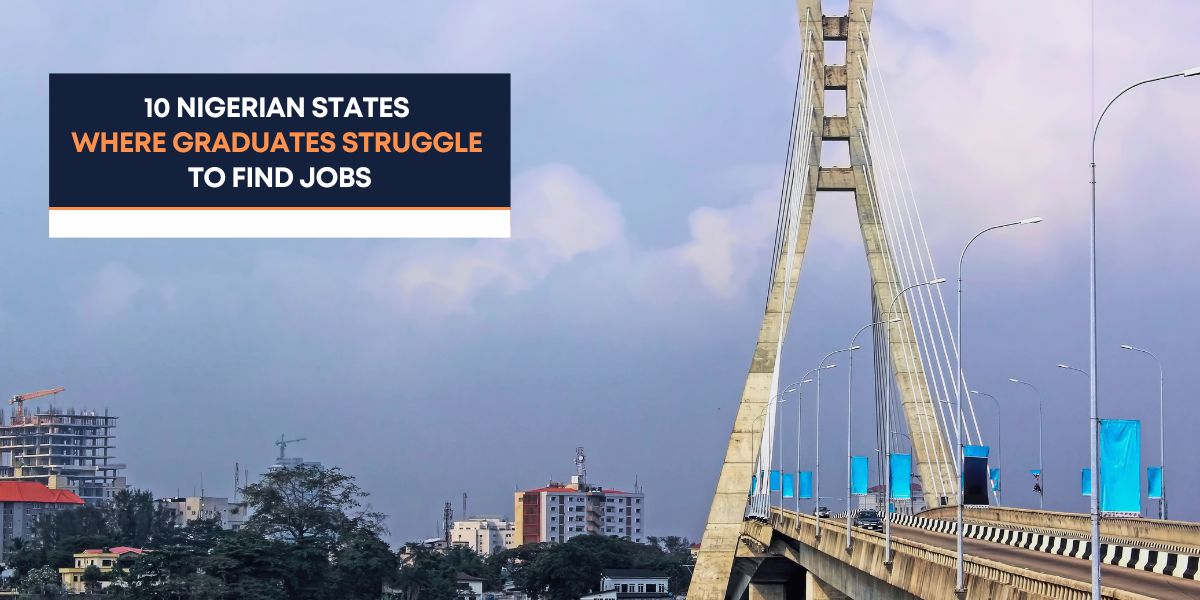Message us on Twitter; we would love to connect! Follow @Past2Pass
— Past2Pass - P2P (@Past2Pass) September 8, 2025
Graduates in Nigeria face significant challenges in finding jobs. While several factors contribute to the high unemployment rate, certain states present greater difficulties for job seekers to find jobs due to economic instability, low industrial activity, and ineffective government policies.
In this article, our focus is on the Nigerian states where graduates struggle to find jobs, as well as what you can do to improve your chances of securing employment.
We use data from National Bureau of Statistics to check each state’s Internally Generated Revenue (IGR), the number of companies in each state reported by businessList, and job vacancies opportunities posted by Past2Pass & other jobs board platform.
1. Yobe
Number of Companies – 38
IGR – ₦11,194,721,282
Yobe’s economy is heavily reliant on agriculture and small-scale trading, which is often subsistence-based and unable to absorb the growing number of graduates. The state also faces security challenges due to insurgency, discouraging investments and industrial growth.
As a result, many graduates are forced to either leave the state or settle for farm cultivation or underemployment.
2. Kebbi
Number of Companies – 40
IGR – ₦11,737,075,709
Though Kebbi is known for its agricultural potential, particularly in rice production, the state has not seen substantial industrial growth. The economy remains largely rural, and while agriculture provides jobs, it does not accommodate the skill sets of most university graduates. With only 40 registered companies, job opportunities in the private sector are limited, leaving many graduates unemployed or underemployed.
3. Taraba
Number of Companies – 73
IGR – ₦10,869,178,343
Taraba’s economy is heavily reliant on agriculture, but the sector lacks the industrialization needed to create sufficient job opportunities for graduates. The state also faces ethnic and communal conflicts, which deter investors and limit economic growth. With only 73 companies operating in the state, graduates often struggle to find meaningful employment, forcing many to migrate to other states in search of better opportunities.
Related: Top Companies that Accept 2:2 Grades for Graduate Trainees
4. Borno
Number of Companies – 119
IGR – ₦19,454,028
Borno has been severely affected by the Boko Haram insurgency, leading to the destruction of infrastructure and businesses. The state’s economy is agrarian, but insecurity has crippled its growth. With only 119 companies operating in the state, job opportunities for graduates are scarce, forcing many to either leave or settle for low-paying jobs.

5. Zamfara
Number of Companies – 56
IGR – ₦22,162,590,810
Zamfara has been in the news for security challenges, which have significantly affected the economic activities of the state. Due to ongoing issues with banditry and kidnappings, businesses have shut down, and companies are reluctant to invest in the state. As a result, it has led to a decline in job opportunities for graduates, particularly in private sector-driven industries. The government remains the major employer, but openings are highly limited, leaving many young people struggling to secure decent jobs.
6. Gombe
Number of Companies – 79
IGR – ₦15,179,050,180
Gombe State, known for its agricultural potential and natural resources like limestone and gypsum, faces challenges in creating job opportunities for graduates. With only 79 registered companies and an internally generated revenue (IGR) of ₦15.1 billion, the state’s economy is largely underdeveloped. The limited presence of industries and private sector investment has left many graduates dependent on government jobs, which are scarce. Additionally, the lack of infrastructure and investment in sectors like mining and agriculture has further restricted job creation, leaving young people with few options.
7. Sokoto
Number of Companies – 103
IGR – ₦17,961,334,445
Sokoto State, rich in mineral resources such as gypsum, limestone, and kaolin, struggles to translate its natural wealth into job opportunities. Despite having 103 companies and an IGR of ₦17.9 billion, the state’s economy remains heavily reliant on subsistence agriculture. The absence of large-scale industries and the underutilization of its mineral resources have limited job prospects for graduates. Furthermore, issues like poor infrastructure and low private sector investment have exacerbated the unemployment crisis, leaving many graduates without viable employment options.
8. Adamawa
Number of Companies – ₦115
IGR – 17,066,189,975
With 115 registered companies and an IGR of ₦17 billion, the state’s economy is underperforming. Adamawa State, endowed with natural resources like bentonite, gypsum, and kaolin, faces significant challenges in providing jobs for its graduates. The persistent insecurity in the region, particularly due to insurgency, has deterred investors and hindered economic growth. As a result, job opportunities are scarce, and many graduates are forced to seek employment in other states or remain unemployed. The government remains the primary employer, but openings are limited and highly competitive.
9. Katsina
Number of Companies – 79
IGR – ₦26,620,333,569
Katsina State, known for its agricultural produce and mineral resources like kaolin and asbestos, has an IGR of ₦26.9 billion. However, the state’s economy is not robust enough to absorb its growing number of graduates. The lack of industrialization and private sector investment has left many young people struggling to find jobs. Additionally, the state’s security challenges, including banditry, have further discouraged businesses from setting up operations. This has led to a reliance on government jobs, which are insufficient to meet the demand, leaving many graduates unemployed or underemployed.
10. Bauchi
Number of Companies – 152
IGR – ₦30,584,925,750
Bauchi State, rich in natural resources such as gold, limestone, and gypsum, has 152 registered companies and an IGR of ₦30.5 billion. Despite these resources, the state struggles to create enough job opportunities for its graduates. The underdeveloped industrial sector and limited private investment have restricted job creation, particularly in fields requiring specialized skills. Additionally, the state’s reliance on agriculture, which is often subsistence-based, has not provided sufficient employment opportunities. As a result, many graduates face challenges in securing decent jobs, leading to high levels of unemployment and underemployment.
What You Can Do to Improve Your Chances of Securing Employment
In Nigerian states where graduates face significant challenges in finding jobs, taking proactive steps can make a difference. Here are some actionable strategies to improve your employment prospects:
1. Relocate to States with Better Job Opportunities
Consider moving to states with thriving economies and more job openings. Notable areas include Lagos, Kaduna, Rivers, and Abuja, which are known for their bustling industries and diverse opportunities. Research the job market in these regions, and prepare for the transition by saving funds and securing temporary accommodation.
2. Upskill for Remote Jobs
The global shift toward remote work has opened new doors for graduates in tech and digital fields. Invest in learning in-demand skills such as software development, digital marketing, artificial intelligence (AI), and data analysis. Platforms like Coursera, Udemy, and LinkedIn Learning offer affordable courses that can help you stay competitive in the job market.
3. Network with Companies in Your Area
Build connections with professionals working at companies in your area. Attend industry events, join professional associations, and leverage LinkedIn to expand your network. Networking can lead to referrals, internships, or even job offers.
4. Consider Self-Employment
If traditional employment remains difficult to secure, explore entrepreneurship. Identify gaps in your local market and start a business that addresses those needs. Whether in agriculture, e-commerce, or service-based ventures, self-employment can provide financial stability and independence.









